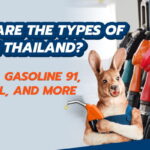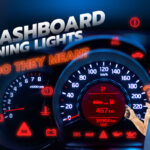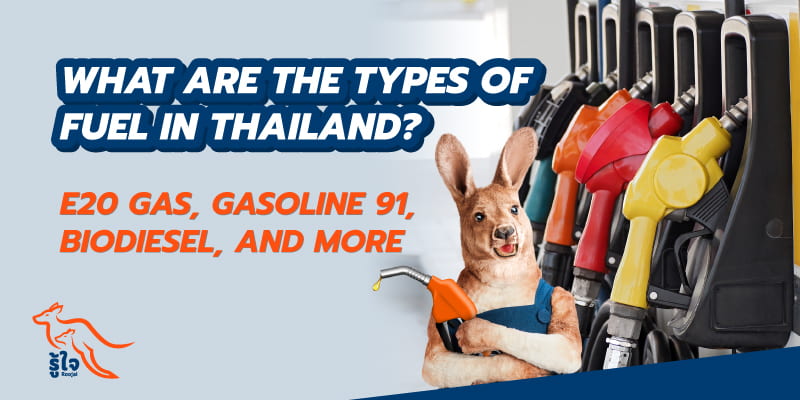
In Thailand, choosing the right fuel for your vehicle can be somewhat confusing, given the variety of options available. From driving down the bustling streets of Bangkok to cruising through the serene countryside, understanding the different types of fuel is essential for every driver. This article breaks down the main fuel types used in Thailand, including gasoline, diesel, natural gas, and liquefied petroleum gas (LPG). By exploring the characteristics and applications of each fuel type, we aim to provide a clear and practical guide to help you make informed decisions at the pump.
What types of fuel are sold in Thailand?
Drivers have several fuel options to choose from, each with its benefits and considerations. In the 80s, Thais primarily used two types of fuel: gasoline and diesel, commonly referred to as solar oil. Over time, a new type of fuel called “special gasoline” or super oil was developed to reduce the import of gasoline and diesel.
Selecting the best fuel for your car is essential for maintaining its performance and longevity. Here’s a guide to help you choose the right fuel and understand how it impacts performance and efficiency, with several types of fuel available, each suited for different car models and engine types.
Regular Gasoline or Gasoline 91
Regular gasoline, or gasoline 91, is a traditional fuel developed by removing lead to ensure complete combustion and minimise environmental pollution. The number 91 represents the octane rating, indicating its combustion efficiency. This fuel is suitable for older gasoline engines, particularly those built before 1990.
- Suitable for:
- Older car models.
- Engines that do not require high-octane fuel.
- Budget-conscious drivers.
- Pros: Generally cheaper.
- Cons:
- May not provide optimal performance for modern engines.
- Lower octane rating can lead to engine knocking in high-performance engines.
Special Gasoline or Gasoline 95
Special gasoline, or gasoline 95, has a higher octane rating, which enhances combustion efficiency and engine performance. Initially designed for small engines and motorcycles, it is now used in various car types for better combustion. However, it is the most expensive fuel on the market and may soon be phased out.
- Suitable for:
- High-performance engines.
- Cars with high compression ratios.
- Drivers seeking better engine performance.
- Pros:
- Prevents engine knocking.
- Ensures smoother operation.
- Enhances engine performance and efficiency.
- Cons:
- More expensive than regular gasoline.
Gasohol 91
In response to the Persian Gulf War in 1990 and the oil crisis of 1997, Thailand developed Gasohol 91 to reduce oil prices and support the economy. This fuel contains 10% ethanol and 90% gasoline. It is suitable for cars designed for this type of fuel, including newer motorcycle models from 2000 onwards.
- Suitable for:
- Most standard engines.
- Environmentally conscious drivers.
- Cars designed to handle ethanol-blended fuels.
- Pros:
- More environmentally friendly than pure gasoline.
- Reduces emissions compared to pure gasoline.
- Cons:
- May not offer the same performance as higher octane fuels.
- Ethanol content can slightly reduce fuel economy.
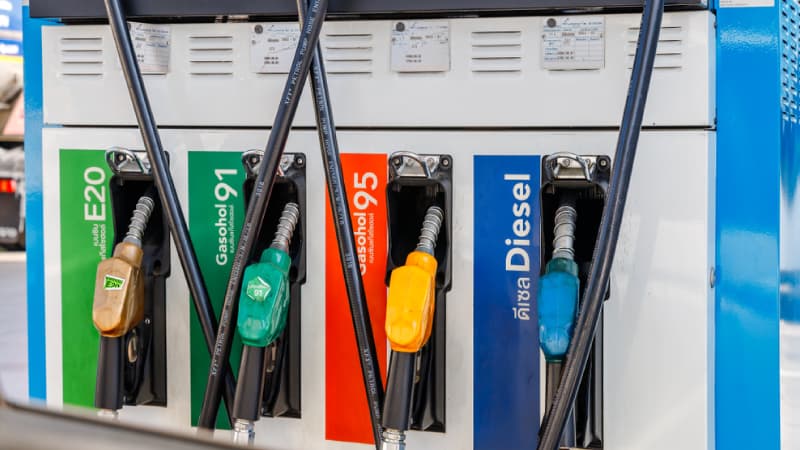
Gasohol 95
Gasohol 95 is designed for more efficient combustion and includes ethanol to reduce costs while maintaining performance. It consists of 95% gasoline mixed with 10% ethanol. This fuel is suitable for cars specifically designed for it, and due to its ethanol content, it requires a specially designed fuel tank to prevent evaporation.
- Suitable for:
- High-performance engines.
- Cars with high compression ratios.
- Drivers seeking better engine protection and efficiency.
- Pros:
- Better engine protection.
- Improved efficiency.
- Prevents knocking and ensures optimal performance.
- Cons:
- More expensive than Gasohol 91.
- Ethanol content can slightly reduce fuel economy.
Gasohol E20
Gasohol E20 is an environmentally friendly fuel option, consisting of 80% gasoline and 20% ethanol. It is designed for newer cars, typically those manufactured after 1997. Using this fuel in older cars may lead to incomplete combustion and engine issues.
- Suitable for:
- Most modern cars designed to handle ethanol-blended fuels.
- Drivers looking for a balance between cost and environmental impact.
- Pros:
- More environmentally friendly.
- Helps reduce emissions.
- Cons:
- May slightly reduce fuel economy due to the lower energy content of ethanol.
- Not suitable for older vehicles not designed for ethanol-blended fuels.
Gasohol E85
Gasohol E85 is a future-oriented fuel, containing only 15% gasoline and 85% ethanol. It burns efficiently but is consumed quickly. Only a limited number of car models are compatible with this type of fuel.
- Suitable for:
- Flex-fuel vehicles designed to run on high ethanol content.
- Drivers looking for a cheaper and cleaner-burning fuel.
- Pros:
- Cheaper than regular gasoline.
- Burns cleaner.
- Cons:
- Lower energy content than gasoline, which can lead to reduced fuel economy.
- Not suitable for all engines due to high ethanol content.
Biodiesel
Biodiesel was developed to address diesel shortages and keep prices stable. There are two types: B7 and B20, which contain 7% and 20% biodiesel (from vegetable oil, animal fat, or waste oil) mixed with pure diesel, respectively.
- Suitable for:
- Diesel engines.
- Drivers seeking a more sustainable fuel option.
- Vehicles used for long-distance driving and heavy loads.
- Pros:
- Lower emissions compared to traditional diesel.
- High energy density, translating to better fuel economy and longer driving range.
- Diesel engines are more efficient in converting fuel into power.
- Cons:
- Availability may be limited compared to traditional diesel.
- Can gel in cold temperatures, requiring additives or heated fuel lines.
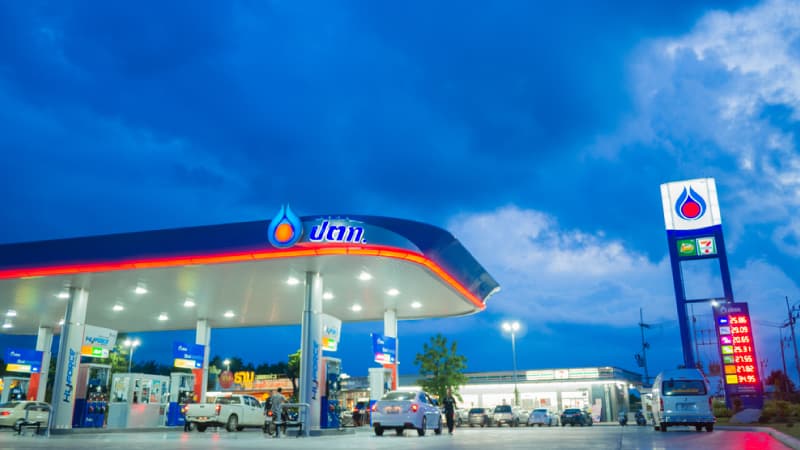
Thai gas stations and refuelling tips
Thailand is home to several well-known gas station brands that offer a range of services to meet the needs of drivers. Some of the most popular gas stations include:
- PTT: Known for its extensive network and high-quality fuel, PTT stations are a common sight across Thailand. The PTT logo features a blue drop shape resembling a lotus flower, with a red dot in the centre. They offer a variety of services, including convenience stores, car washes, and cafes.
- Shell: Shell stations are recognized for their premium fuel options and excellent customer service. They also provide additional amenities such as loyalty programs and clean restrooms.
- Bangchak: This brand is noted for its commitment to sustainability and offers a range of biofuels. Bangchak stations often feature eco-friendly initiatives and community-focused services.
- Esso: Esso stations are known for their reliable fuel quality and comprehensive services, including convenience stores and car maintenance facilities.
These stations are strategically located throughout the country, ensuring that drivers have easy access to fuel and other essential services. Refuelling your car efficiently and safely is crucial for maintaining your vehicle’s performance and maximising fuel efficiency. Here are some practical tips:
- Know your fuel type: Always use the type of fuel recommended by your car manufacturer. Using the wrong type of fuel can damage your engine and reduce efficiency.
- Refuel during cooler times: Fuel expands with heat, so refuelling during cooler parts of the day (early morning or late evening) can ensure you get more fuel for your money.
- Avoid overfilling: Stop refuelling when the pump automatically shuts off. Overfilling can lead to fuel spillage and waste.
- Check for leaks: Regularly inspect your fuel cap and fuel lines for leaks. A tight fuel cap helps prevent fuel evaporation and maintains fuel efficiency.
- Ask for help: If unsure, ask the attendants for assistance. They are usually very helpful.
- Use reputable stations: Stick to well-known gas stations like the ones listed above for better fuel quality and service.
- Understand local practices: In some areas, attendants will refuel your car for you. Make sure to communicate clearly about the type of fuel you need.
What happens when you put the wrong type of fuel?
Putting the wrong fuel in your car can cause various issues. Diesel in a gasoline engine may prevent it from starting or cause it to run poorly, requiring the fuel system to be drained. Gasoline in a diesel engine can cause significant damage due to lack of lubrication, potentially harming the fuel pump and injectors.
Using regular gasoline in a premium engine can reduce performance and efficiency, while ethanol (E85) in a gasoline engine may trigger the “check engine” light. If you misfuel, seek professional help to drain and clean the system. Always double-check the fuel type before filling up to avoid these problems.
What to do if you put in the wrong fuel
If you realise you’ve put the wrong fuel in your car, it’s important to act quickly to minimise potential damage. Here are the steps you should follow:
- Do not start the engine: If you haven’t started the car yet, don’t turn the key. Starting the engine can spread the incorrect fuel throughout the system, leading to further damage.
- Stop the engine immediately: If you’ve already started the car, turn it off as soon as you realise the mistake. This can help prevent further damage.
- Inform the gas station: Let the staff at the gas station know about the situation. They might have procedures in place to assist you.
- Call for professional help: Contact a roadside assistance service or a mechanic to drain and clean the fuel system. They have the required tools and expertise to handle the situation safely.
- Do not attempt to drive: Avoid driving the car, as this can cause more extensive damage to the engine and fuel system.
- Check your car insurance: Some insurance policies cover misfuelling. Check with your provider to see if you’re covered for the costs associated with draining and cleaning the fuel system.
- Follow-up with maintenance: After the wrong fuel has been removed, have your car inspected by a professional to ensure there are no lingering issues.
When something like filling the wrong fuel occurs, learning the right type of fuel for your car can help avoid damage to your car. Similarly, having reliable car insurance provides peace of mind for unexpected events on the road, such as breakdowns, running out of fuel, or a dead battery. With Roojai, you’re covered 24/7 with emergency roadside assistance available throughout Thailand. Our easy claim process and guaranteed repair quality for up to 12 months ensure you’re always taken care of, no matter where or when.
Stay updated with the latest news, health tips, and information about cars, motorcycles, and online insurance by following Roojai. You can visit our Roojai Facebook Page or add us as a friend on LINE with our Official ID: @roojai.

